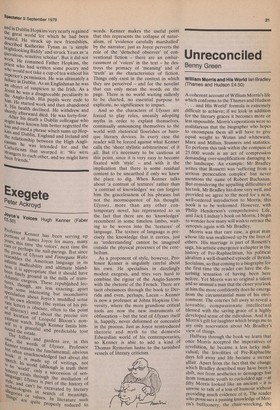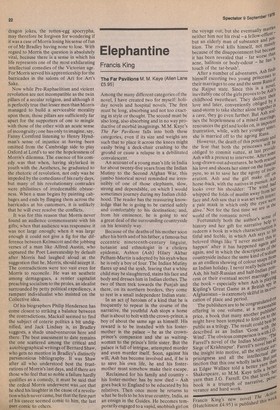Unreconciled
Benny Green
William Morris and His World Ian Bradley (Thames and Hudson £4.50) A coherent account of William Morris's life which conforms to the Thames and Hudson . . and His World' formula is extremely difficult to achieve; if we look in addition for the literary graces it becomes more or less impossible. Morris's operations were so multifarious that the biographer who hopes to encompass them all will have to give equal weight to Wotan and whitewash, Marx and Millais, Stunners and statistics. To perform this task within the compass of 25,000 words is an act of compression demanding over-simplifications damaging to the landscape. An example: Mr Bradley writes that Rossetti was 'suffering from a serious persecution complex' but never mentions the name of Robert Buchanan. But considering the appalling difficulties of his task, Mr Bradley has done very well, and provided we agree to the need for a neat, well-ordered introduction to Morris, this book is to be welcomed. However, with Philip Henderson's comprehensive Life, and Jack Lindsay's book on Morris, I begin to wonder how many will wish to retrace the synopsis again with Mr Bradley.
Morris was that rare case, a great man whose life was swallowed up by the lives of others. His marriage is part of Rossetti's saga, his artistic emergence a chapter in the history of Pre-Raphaelitism, his political idealism a well-thumbed episode of British Socialism, so that coming to a biography for the first time the reader can have the disturbing sensation of having been here before. Yet Mortis was so original a talent and so unusual a man that the closer you look at him the more confidently does he emerge from the circumstantial mass of his environment. The coteries fall away to reveal a loveable, compassionate intellectual blessed with the saving grace of a highly developed sense of the ridiculous. And it is Morris's gift for laughter which brings me to my only reservation about Mr Bradley's view of things.
Halfway through the book we learn that once Morris accepted the imperatives of revolution, he became a less larky individual; the frivolities of Pre-Raphaelite days fell away and life became a sterner affair. Apart from the fact that the change which Bradley described may have been a shift, not from aesthetics to demagogy but from romantic youth to cuckolded age at fifty Morris looked like an ancient — it is unwise to talk of a loss of humour without providing much evidence of it. The reader who possesses a passing knowledge of Morris's buffoonery, the chair-wrecking, the dragon jokes, the rotten-egg apocrypha, may therefore be forgiven for wondering if it was a case of Morris losing his sense of fun or of Mr Bradley having none to lose. With regard to Morris the question is absolutely vital, because there is a sense in which his life represents one of the most exhilarating intellectual comedies of the Victorian age. For Morris served his apprenticeship for the barricades in the salons of Art for Art's Sake.
Now while Pre-Raphaelitism and violent revolution are not incompatible as the twin pillars of a secular religion, and although it is perfectly true that lesser men than Morris managed to build a serviceable morality upon them, those pillars are sufficiently far apart for the supporters of one to mingle with those of the other with an acute sense of incongruity; one has only to imagine, say, Fanny Cornford listening to Henry Hyndman's sense of injustice at having been omitted from the Cambridge side to play Oxford at Lord's to see the hopelessness of Morris's dilemma. The essence of his comedy was that when, having skylarked in youth with the Aesthetes, he graduated to the rhetoric of revolution, not only was he impeded by the comedians of his early days, but many of his revolutionary comrades were philistines of irredeemable obtuseness. When a man begins by painting cabbages and ends by flinging them across the barricades at his customers, it is unlikely that he will ever resolve the conflicts.
It was for this reason that Morris never found an audience commensurate with his gifts; when that audience was responsive it was not large enough; when it was large enough it could not give a fig for the difference between Kelmscott and the jobbing verses of a man like Alfred Austin, who captured the Poet Laureateship by default after Morris had laughed aloud at the suggestion that he, Morris, should accept it. The contradictions were too vast even for Morris to reconcile. He was an aesthete among demagogues, a rentier capitalist preaching socialism to the proles, an idealist surrounded by petty political expediency, a rampant individualist who insisted on the Collective idea.
Of his biographers Philip Henderson has come closest to striking a balance between the contradictions. Mackail seemed to find the subject of coterie politics a bit undignified, and Jack Lindsay is, as Bradley suggests, a shade unadventurous here and there. The best assessment to date remains the one scattered among the critical and autobiographical writings of Bernard Shaw, who gets no mention in Bradley's distinctly parsimonious bibliography. It was Shaw after all who understood best the frustrations of Morris's last days, and if there are those who feel that so noble a failure hardly qualifies as a comedy, it must be said that the ordeal Morris underwent was not that he shed his laughter in the cause of a revolution which never came, but that the first part of his career seemed comic to him, the last part comic to others.



































 Previous page
Previous page